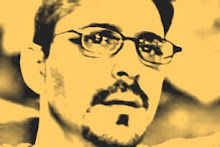The Next Big Thing
So, it has been a number of years since I've bothered to post. I really had nothing worth saying, anyway.
But...
Whit Griffin recently invited me to participate in a kind of viral
interview project called The Next Big Thing, which, I admit, I probably had a little too much fun with. His interview can be found here. For
next week, I’ve invited Jess Mynes to participate.
What is the working title of the book?
Near Point
Balance.
Where did the idea come from for the book?
I’m a word writer, not strictly an
idea writer, a point to which I’ll return later. Suffice it to say, the book
emerged from the writing of the book. That said, the art of rock balancing
eventually occurred to me as analogous to not only creating a poem, but to the
mathematically isomorphic structuring of an entire book as well, hence the
title. The act of finding a form specific to its occasion carries over, too,
into the precarity of daily life. How does one create the specifically lived
rhythms of a given day? How does one structure life meaningfully? It would be
unfortunate to mistake balance for symmetry.
What genre does your book fall under?
As a term of convenience, poetry. I have my suspicions about
“genre.”
What actors would you choose to play the part of your characters
in a movie rendition?
The
movie rendition? Fun question. Friends who appear throughout the book would
play themselves. Lovely cameos.
As
for others who deliver lines specifically in “A Slip of the Pencil and We Begin
to Draw a Passage”—a dense prose poem that constitutes four major sections of
the book—it would be an interesting game of semblances for readers themselves
to decide on the actors.
The
main cast, not in order of appearance:
Socrates,
Plato, Diogenes, Walt Whitman, Phil Guston, Jack Clarke, W.C. Williams, Joseph
Ceravolo, Erwin
Schrödinger, René
Descartes, Octavio Paz, Edgar Allen Poe, Diane Di Prima, David Hilbert, Frederic Jameson, Hannah Arendt, Paul
Blackburn, Rosmarie Waldrop, Jed
Rasula, Clark Coolidge, Samuel Coleridge, Charles Olson, Madeline Gins, Sigmund
Freud, Jacques Derrida,
David Antin, Ezra
Pound, Mahatma Gandhi, Gertrude Stein, and Albert Einstein.
Now
that I’ve compiled this list, I have to say that Mandy Patinkin and Ian
McKellen should star in this movie. I’d very much like to be played by Katee
Sackhoff.
And
since we’re making a movie, I’d have to add a part specifically for Felicia
Day.
What is the one sentence synopsis
of your book?
The book carries two epigraphs, the
first by Clark Coolidge and the second by Charles Olson. The Olson epigraph can
effectively serve as a synoptic epitaph as well: “Writing is what love is.”
How long did it take you to write
the first draft of the manuscript?
Unlike my latest book, Of Love & Capital, which was written
over the period of several months, Near
Point Balance collects a range of work written and variously published in
magazines, chapbooks, and whatnot over the period of several years, during
which time Playing the Amplitudes appeared,
in fact.
Who or what inspired you to write
this book?
Writing itself inspires me. See
said synopsis. Which is as much to say that ideas—ideals—stripped of their materiality don’t inspire me to either
actualize rational poetic form, or try to disrupt said rationality. The dialectical
divide between the real and the ideal is too 400 BC for me. I’m not interested
in footnoting Plato.
What else about your book might
pique the reader’s interest?
I prefer not to presume. Is that
too Bartleby of me?
Will your book be self-published or
represented by an agency?
Agency? Near Point Balance is forthcoming from Skysill
Press, but I had originally wanted to be represented by Fringe Division. Dr.
Bishop turned down the manuscript. “Fascinating, but not enough Bowie,” he
said.

